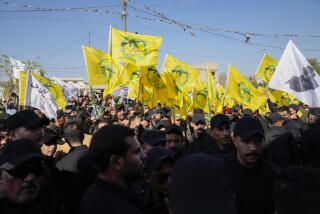Sealing a Trade Deal With Human Lives : Iran-Iraq: Baghdad sends Iranian resistance fighters home to certain death to secure supplies from Tehran.
- Share via
Hostage politics have taken a new and cruel twist in the gulf crisis. In exchange for Iranian aid, Iraq is now delivering Iranian resistance movement members operating in Baghdad to Iran, where they will almost certainly be executed.
Among the Iranians sent back to Iran recently as prisoners of war were a number of members of the National Council of Resistance of Iran, commonly known as the People’s Moujahedeen, the best-organized opposition to Iran’s clerical regime since the revolution. When detected in Iran, moujahedeen members are regularly executed. Thus, Iraq’s delivery of them to Iran amounts to a death sentence.
Iraq’s current plight must seem like an astounding stroke of good fortune in Tehran, especially since Iraq seems willing to pay extravagantly for help.
And Iran is the one nation in the region unlikely to pay much attention to U.S. entreaties for support of the economic embargo against Iraq. Iran wants the United States out of the region even more than it wants Iraq out of Kuwait.
Much more than an ideological opposition group, the moujahedeen have created an independent armed opposition to the Islamic leadership in Tehran. Secular and leftist in their political orientation, they were part of the revolution that overthrew the Shah in 1979.
That year, conservative religious groups had consolidated their power throughout Iran. After eliminating all secular nationalists from the revolutionary government, the clerics began pursuing and arresting moujahedeen. The moujahedeen went underground. Their leaders, Massoud and Maryam Rajavi, eventually shifted the movement to Baghdad where they enjoyed the support of the Iraqi government.
It is difficult to accurately gauge the success of the moujahedeen. By their own account they constitute a major threat to the Tehran regime, and tens of thousands have been executed in Iran. Their slick publicity shows thousands of troops--men and women--in continual training, and announces regular battles with the Iranian army in border areas. In addition, they claim to have guerrilla forces throughout Iran ready to lead strikes and civil disturbances. They operate clandestine radio stations and maintain a significant international network of Iranian emigres who demonstrate against the current government throughout the world, with emphasis on its human-rights abuses.
Whether the moujahedeen are dangerous or not, they have symbolic importance as the last strong organized opposition to the revolutionary government in its current form.
This initial shipment of moujahedeen is likely a show of good faith on the part of Saddam Hussein. As Iran complies with Iraq’s requests for supplies, it is likely that more of the moujahedeen will be sent over the border. The rate of their release to Iranian officials can thus be seen as a rough index of Iran’s cooperation with Iraq in defiance of the international embargo.
As reprehensible as these actions seem, they show the length to which both Iran and Iraq are willing to exploit the current Middle East crisis for their own benefit. They also show how difficult it will be for external powers like the United States to affect the political dynamics that obtain between these two regional powers.
More to Read
Sign up for Essential California
The most important California stories and recommendations in your inbox every morning.
You may occasionally receive promotional content from the Los Angeles Times.










